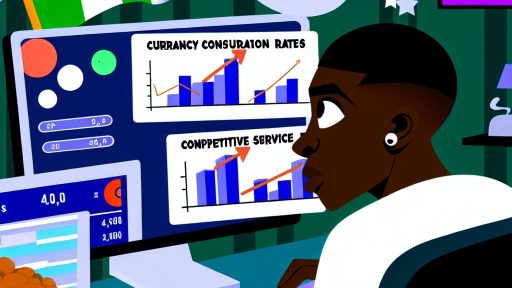Understanding the Importance of Timely Payments for Freelancers
Financial Stability
Timely payments ensure financial stability for freelancers.
They help manage monthly expenses like rent and utilities.
A consistent cash flow fosters financial security.
Without timely payments, freelancers may struggle to meet financial obligations.
Building Professional Relationships
Receiving payments on time enhances professional relationships.
Clients notice reliability and commitment in freelancers who manage this well.
Moreover, it builds trust, leading to repeat business opportunities.
A strong network often results from timely transactions.
Impact on Project Continuity
Late payments can disrupt project continuity.
They may lead to delays, affecting project deadlines adversely.
Moreover, this can cause freelancers to prioritize other clients.
Consequently, project quality may suffer, impacting overall reputation.
Reputation Management
In the freelance community, reputation is crucial.
Timely payments contribute to a positive perception among peers.
On the flip side, late payments can tarnish a freelancer’s reputation.
Transform Your Freelance Journey
Unlock your potential with expert Freelance Consulting. Receive a personalized PDF in 1-3 business days, with revisions until you're satisfied.
Get StartedUltimately, this can lead to fewer opportunities in the future.
Emotional Well-Being
Financial uncertainty affects emotional well-being.
Timely payments alleviate anxiety and stress for freelancers.
When payments arrive on schedule, freelancers feel more stable.
This enables them to focus on delivering high-quality work.
Common Reasons for Late Payments in the Nigerian Freelancing Space
Lack of Clear Contracts
Many freelancers in Nigeria often work without written agreements.
This oversight leads to confusion about payment terms.
Clients might not feel obligated to pay without a contract.
Clear contracts can prevent misunderstandings.
Cash Flow Issues
Clients frequently face their own cash flow problems.
Delayed payments can result from their financial struggles.
Sometimes freelancers must wait due to their clients’ poor planning.
This situation highlights the importance of flexibility.
Client Prioritization
Some clients prioritize other expenses over paying freelancers.
Transform Your Freelance Profile into a Client Magnet
Unlock unparalleled opportunities with a profile that stands out. We craft compelling summaries and optimize your skills to attract high-paying clients no one else can reach.
Optimize NowThey may see freelance payments as non-essential.
This often leads to delayed or missed payments.
Understanding client priorities can help manage expectations.
Inefficient Payment Systems
The payment systems in Nigeria can be slow and cumbersome.
Bank transfers might take several days to process.
These inefficiencies can contribute to late payments.
Being aware of these issues can help freelancers plan accordingly.
Lack of Communication
Poor communication can lead to misunderstandings about payment timelines.
Freelancers should establish clear lines of communication with clients.
Regular updates can help ensure both parties stay informed.
Establishing an open dialogue can prevent issues later.
Client Side Changes
Sometimes clients experience changes in management or processes.
These changes may delay payments unexpectedly.
Staying flexible can help freelancers navigate such situations.
Reveal Your Untapped Niche for Maximum Earnings
Imagine excelling in a niche where your skills shine and competition fades. We analyze markets and your talents to pinpoint the most profitable niches uniquely tailored to you—opportunities others overlook.
Find NicheBeing patient and understanding goes a long way in maintaining relationships.
How to Set Clear Payment Terms and Conditions from the Start
Defining Payment Structure
Clearly outline your payment structure before starting any project.
Decide if you will charge hourly or per project.
This decision impacts how clients perceive your work.
Additionally, set a standard rate that reflects your skills.
Establishing Due Dates
Specify due dates for payments in your contract.
Explain when you expect payments to be made.
For instance, establish a 50% upfront payment.
Then, indicate when the remaining balance is due.
Communicating Consequences
Be upfront about any consequences for late payments.
Consider implementing late fees for overdue payments.
This encourages timely payments and protects your finances.
Moreover, explain your policy during client discussions.
Creating a Formal Contract
A contract serves as a legal document outlining all terms.
Include clear payment terms to avoid misunderstandings.
Additionally, have both parties sign the contract.
This aids in resolving disputes that may arise later.
Regularly Reviewing Terms
Regularly review and update your payment terms as needed.
Market trends may warrant changes in your payment structure.
Adapting to client feedback can also enhance your process.
Ensure your terms remain fair and competitive.
Learn More: Why Clear Payment Terms are Crucial for Freelancers
Effective Communication Strategies to Address Late Payments
Understanding the Importance of Communication
Effective communication is crucial when handling late payments.
It helps to build strong client relationships.
Additionally, clear communication ensures that issues are addressed proactively.
Initiating Contact with Clients
Start by reaching out to your client promptly.
Use a friendly yet professional tone in your communication.
Your goal is to remind them of the unpaid invoice.
Keep your message concise and to the point.
Consider using email or a direct message for this purpose.
Crafting a Clear Message
Your message should include key details about the invoice.
Clearly state the amount due and the original due date.
Also, mention any late fees or payment terms agreed upon.
This information helps the client understand the urgency.
Offering Flexible Solutions
Sometimes clients may face genuine difficulties.
Consider discussing flexible payment options.
Options can include payment plans or extended deadlines.
Being accommodating fosters goodwill and trust.
Follow-Up Reminders
If payments continue to be late, send follow-up reminders.
These should reiterate previous messages professionally.
Use a structured approach to highlight past communication.
This shows consistency and helps to keep your case strong.
Documentation and Record-Keeping
Always keep records of all correspondences related to payments.
This includes initial invoices and follow-up communications.
Good documentation is key if disputes arise later.
It can serve as evidence of your efforts to communicate.
Establishing Clear Payment Terms
Set clear payment terms from the beginning of your contract.
Make sure all clients are aware of these terms upfront.
This reduces misunderstandings and encourages timely payments.
Utilizing Payment Platforms
Consider using reliable payment platforms.
These platforms often automate reminders and notifications.
They can help streamline the payment process immensely.
Maintaining Professionalism
Throughout all communications, maintain a professional demeanor.
Your tone can significantly impact the outcome of your request.
Even in difficult situations, professionalism fosters respect.
Learning and Adapting
Finally, learn from each late payment experience.
Adapt your communication strategies for better effectiveness.
Continuous improvement can lead to smoother transactions in the future.
Learn More: Pricing Strategies for Nigerian Freelancers in a Competitive Market
Creating a Professional Invoice and Payment Reminder System
Importance of a Professional Invoice
A professional invoice enhances your credibility as a freelancer.
It communicates your brand and image effectively.
Moreover, it outlines the payment terms and project details clearly.
Your clients will appreciate a well-structured document.
Essential Elements of an Invoice
Include your business name and contact information at the top.
Add the client’s name and address next, ensuring clarity.
List the services provided along with their corresponding costs.
Include the invoice date and payment due date for transparency.
Lastly, provide payment methods for convenience.
Designing Your Invoice Template
Utilize tools like Canva or Google Docs to create an appealing template.
Ensure your invoice is visually cohesive with your branding.
Maintain a professional font and consistent color scheme throughout.
Also, ensure enough spacing for your content for easy readability.
Implementing a Payment Reminder System
A payment reminder system can greatly improve cash flow.
First, set up reminders for your clients ahead of the due date.
Use email or messaging apps to ensure they receive notifications.
Visual reminders can prompt quicker payments from clients.
Types of Payment Reminders
Start with a polite initial reminder a few days before payment is due.
If the payment is late, send a follow-up reminder after a week.
Add a gentle tone to maintain professionalism in your communication.
Maintaining Professionalism in Communication
Always address your client by name in reminders.
Express appreciation for their business and promptness in payments.
Offer assistance if they have questions about the invoice.
This approach fosters a positive and professional relationship.
Gain More Insights: Charging by Value: How Nigerian Freelancers Can Earn More by Pricing for Impact

Utilizing Legal Contracts to Protect Against Late Payments
The Importance of Contracts
Contracts are essential for freelancers in Nigeria.
They create a clear agreement between parties.
Moreover, contracts serve as legal documents in disputes.
Key Elements of a Solid Contract
Employ clear and concise language throughout the document.
Include the scope of work to define your services clearly.
Lay out payment terms to avoid misunderstandings.
- Specify payment amounts.
- Include due dates for payments.
- Outline accepted payment methods.
Additionally, include provisions for late payments.
Specify penalties to enforce timely payments.
Enforceability of Contracts
Ensure all parties sign the contract to make it legally binding.
Consider having it notarized to further protect yourself.
Store signed contracts securely for future reference.
Communication and Clarity
Maintain open lines of communication with clients.
Discuss contract details before finalizing agreements.
This transparency builds trust and reduces conflicts.
Consulting Legal Professionals
Consider involving a lawyer for contract creation.
A legal expert can ensure compliance with local laws.
They can also help draft enforceable terms.
Ultimately, this protects you from potential disputes.
Explore Further: Why Flexible Pricing Models Could Be the Game-Changer for Nigerian Freelancers
Exploring Payment Platforms and Tools for Faster Transactions
Importance of Choosing the Right Payment Platform
Selecting an appropriate payment platform is crucial for freelancers.
It can significantly enhance the speed of transactions.
A reliable system helps avoid late payments.
Thus, it is essential to assess available options.
Popular Payment Platforms in Nigeria
Several payment platforms cater to freelancers in Nigeria.
Paystack is widely recognized for its user-friendly interface.
It allows seamless transactions for local and international clients.
Flutterwave also stands out with its extensive payment methods.
You can accept payments in various currencies efficiently.
Additionally, Remita offers robust invoicing features for freelancers.
Key Features to Look For
When evaluating payment platforms, consider several key features.
Security should be a top priority for any platform.
Ensure the platform adheres to international safety standards.
Speed of transactions is another critical factor.
Look for platforms that offer quick processing times.
Finally, check the fees associated with each platform.
Low fees can significantly affect your overall earnings.
Utilizing Modern Tools for Payment Management
Use tools that integrate well with your chosen payment platform.
Accounting software can automate tracking your payments.
These tools can generate invoices and send reminders.
Ultimately, this helps maintain a professional image.
Moreover, it reduces the chances of human error in payments.
Best Practices for Managing Payments
Establish clear payment terms with clients upfront.
This practice helps set expectations from the beginning.
Additionally, consider requesting a deposit for larger projects.
Inevitably, this minimizes financial risk on your end.
Furthermore, communicate regularly with clients about payment timelines.
Staying Prepared for Delays
Even with the best systems, delays can still occur.
Prepare for potential payment issues by having a contingency plan.
This might include setting aside emergency funds for your expenses.
Regularly reviewing your cash flow can also be beneficial.
Building Long-Term Client Relationships to Minimize Payment Issues
Establish Clear Communication
Start every project with clear communication about expectations.
Discuss project scope, deadlines, and payment terms upfront.
This clarity helps establish trust from the beginning.
Regularly check in with clients during the project.
Updates foster a collaborative atmosphere and prevent misunderstandings.
Create a Professional Agreement
A detailed contract protects both you and your client.
Specify the payment terms, including deadlines and methods.
Include clauses for late payments to encourage timely settlement.
Proposals should outline deliverables and timelines clearly.
This structure sets the stage for a professional relationship.
Build Rapport with Clients
Take time to understand your clients’ needs and preferences.
A personal touch can make the working relationship more enjoyable.
Share relevant updates about your work to keep them engaged.
Show appreciation for their business through follow-ups and thank-yous.
This helps in building long-term relationships that last.
Set Up a Payment Schedule
Consider breaking large projects into smaller phases.
Request partial payments upon reaching specific milestones.
This method improves cash flow and reduces financial pressure.
A payment schedule can also motivate clients to prioritize your invoices.
Use Automated Invoicing Tools
Automated invoicing tools streamline payment processes.
Consider tools like FreshBooks or QuickBooks for efficiency.
Automated reminders can help clients remember payment deadlines.
These tools also track payment history for future reference.
Be Proactive in Handling Delays
If a payment is delayed, address it immediately.
Politely remind the client of the overdue invoice.
Maintain a professional tone while resolving the issue.
Offer to provide additional information if needed.
This approach demonstrates your commitment to their project.
Additional Resources
SWIFT money transfer and fees guide
Deh Chukwuka (SLiQ) on LinkedIn: If You’re A Nigerian freelancer …




